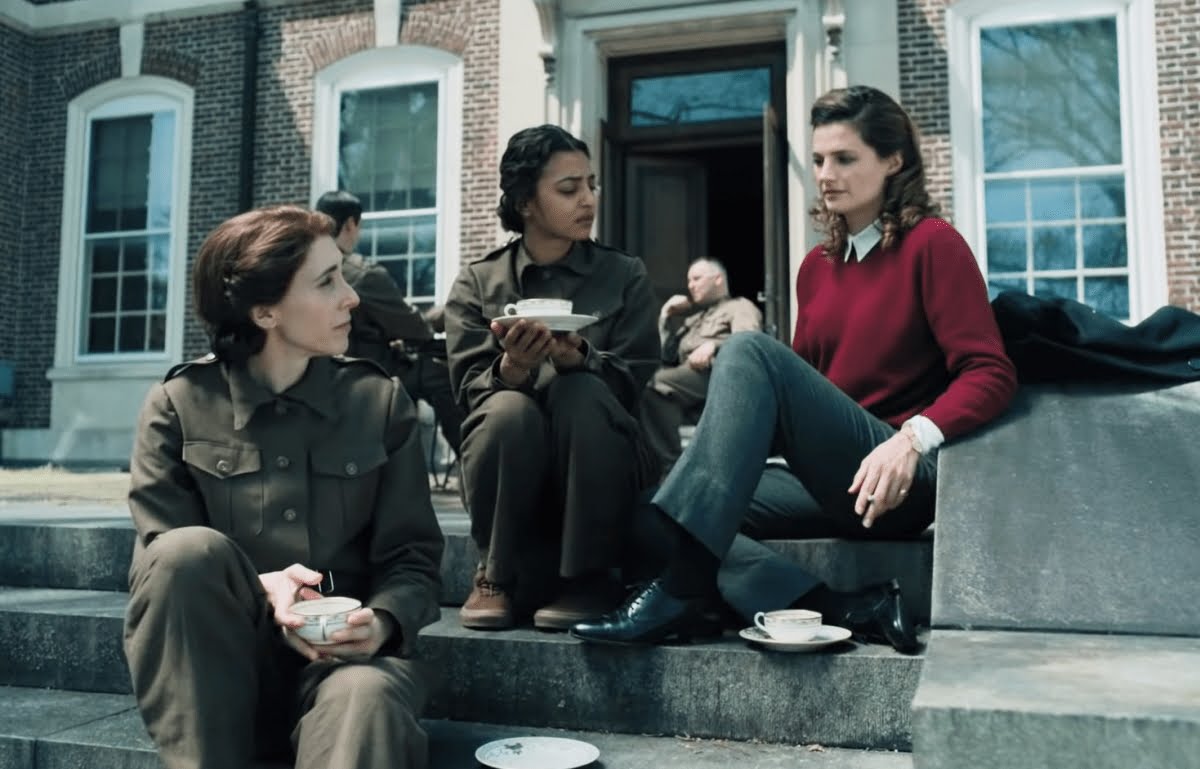A Call to Spy is a story of three women at the beginning of the World War II – two white and one brown woman who work for British Intelligence and are bolstering British efforts to thwart increasing Nazi occupation of Europe. Each woman is prompted by a different reason to undertake a near impossible mission. Vera Atkins, who works as a secretary to a senior officer spearheading the intelligence operations, is in many ways, the “ideas” person as she is the one who insists on handpicking certain kinds of women who will be a lot less suspicious than male spies which turns out to be quite the case. Vera’s unquestionable dedication, her thorough professionalism and her absolute loyalty to the government is ironically apparent to the viewer of A Call to Spy but not to a government and her colleagues in the department who caste aspersions on her loyalties because of her Jewish birth.
A Call to Spy is a story of three women at the beginning of the World War II – two white and one brown woman who work for British Intelligence and are bolstering British efforts to thwart increasing Nazi occupation of Europe.
It is also because of her Jewish identity that she is denied citizenship, despite masterminding most of the intelligence operations and recruiting some exceptionally good field agents. The uncertainty governing her non-citizen status is briefly addressed in A Call to Spy through her interactions with her mother whereas it is her hurt pride that is foregrounded when she speaks with her boss about it. More than once is the doubt which the institution harbors against her brought up in A Call to Spy in the course of the narrative but we are not given access to the inner turmoil or pain Vera suffers because of this. We always get to see her as the very poised, confident, composed, no-nonsense woman who thinks on her feet and takes over the reins at a time when her boss is faltering and on the verge of giving up after a colossal failure when their wireless “Noor” in Paris is compromised and a whole lot of spies neutralised by the Nazis.

While Vera struggles with the truth of her birth identity and the unlawful nature of her existence in Britain which makes her life so rootless and uncertain with the engulfing fear of being deported anytime, her Jewishness standing to undermine all that she has done or does for the agency, Virginia Hall battles her disability which prevents her from being selected as a diplomat in the American embassy. In A Call to Spy, a dejected Virginia is approached by Vera to serve as a spy, even as people at the agency doubt Virginia’s ability to perform since she has a prosthetic leg. But for Vera, this is the exact cover for a spy, as no one would suspect a woman, that too with a limp, to be a trained spy. It is eventually Virginia’s ingenuity, her observations resulting from her hands-on experience as a spy and her expertise which lead to the building up of a robust “wireless” base to support the spies in their operations and communication.

If it is the right to earn a citizen status which keeps Vera going and even prompts her to enter a tough negotiation with her boss and Virginia’s urge to prove that her disability cannot keep her from scaling impossible heights, it is the desire to be recognised and acknowledged by the British state which prompts a “brown” Indian Noor Inayat Khan to join the secret service and finally lay her life for the cause. Her wish is symbolic of the subaltern’s desire to be noticed by the coloniser and seen as worthy, a reification of sorts. Though A Call to Spy, in the conventional sense of story-telling of female war heroes, does a commendable job of depicting these positive femininities, the camera undoubtedly adopts a “Doxic” British patriarchal perspective which fails to give us access to the interior monologues of these women or a shared female space which might serve as a safe space for their psychic battles and inner conflicts to surface or manifest. Likewise, A Call to Spy misses the opportunity to capture the dynamics and nuances of mother-daughter relationships and instead just glides over them cursorily.
Also read: Noor Inayat Khan: ‘Spy Princess’ Of World War II | #IndianWomenInHistory

While the narrative is brutally honest in its depiction of the ruthless and spine-chilling atrocities of the Nazi regime, A Call to Spy fails to even briefly problematise British colonialism.
All three women are divested of their femininity as they gear up to enter a very patriarchal order and get assimilated into the patriarchal institution of secret service. While the narrative is brutally honest in its depiction of the ruthless and spine-chilling atrocities of the Nazi regime, A Call to Spy fails to even briefly problematise British colonialism. Though understandably, A Call to Spy is only a film and one can do only so much in less than two hours, as a woman viewer one keeps waiting for the camera to shed its patriarchal lens and take up a more sensitive and sympathetic gaze, for instance like it does in the series “Homeland” which is also the story of a female spy, a CIA agent Carry Mathison. Homeland is telling in exposing the deeply-entrenched gender biases that are often institutionalised and thereby justified even as powers that be, dismiss traditionally feminine traits like intuitiveness and empathy and celebrate more masculine virtues like aggression, violence and strong-arm tactics. A Call to Spy also engages in a very sensitive delineation of the life of a female spy and the multiple institutions and adversaries she is pitted against besides the “common enemy”.
Also read: Film Review: Act 1978 And The Pregnancy Trope
The predicament of being a spy is that it leaves you literally in “no man’s land”. If your cover is blown, you are pretty much on your own. Ironically, being a female spy in that sense perhaps carries the possibility of giving the woman a sense of belonging even if it is in a traditionally male space and assuaging her ontological anxiety of not belonging anywhere even if it eventually leads to the possibility of being disowned or denounced. This is perhaps the reason these women surpass themselves and people’s expectations of them whether it is Vera in the way she starts from scratch again or Virginia who escapes unscathed or Noor who lays her life. They outperform everybody and so does their onscreen emotional inscrutability.
Sadly though, the relative indiscernibility of the various roadblocks to self-recognition, the failure to adequately critique the ways in which they are constructed and conceived, their personal conceptions of their “self” as they serve “the other”, their inner predicaments resulting out of their apparent identity crises since each of them stands marginalised in a different way, which are deep concerns related to the politics of identity and multiculturalism, fail to find a dialogical representation in A Call to Spy.
Featured Image Source: flickeringmyth.com
About the author(s)
Dr. Shyaonti Talwar is an academician, researcher and a writer whose areas of interest include popular culture, social inequality, literature, mythology and gender. A poet and a performing artist, she loves creative expressions and feels it is important to voice her critical observations. Writing is therapeutic for her and makes her feel awake and alive. She can be found on LinkedIn and Twitter.




Very nice madam.
Patriarchy , many time where women are double marginalised.